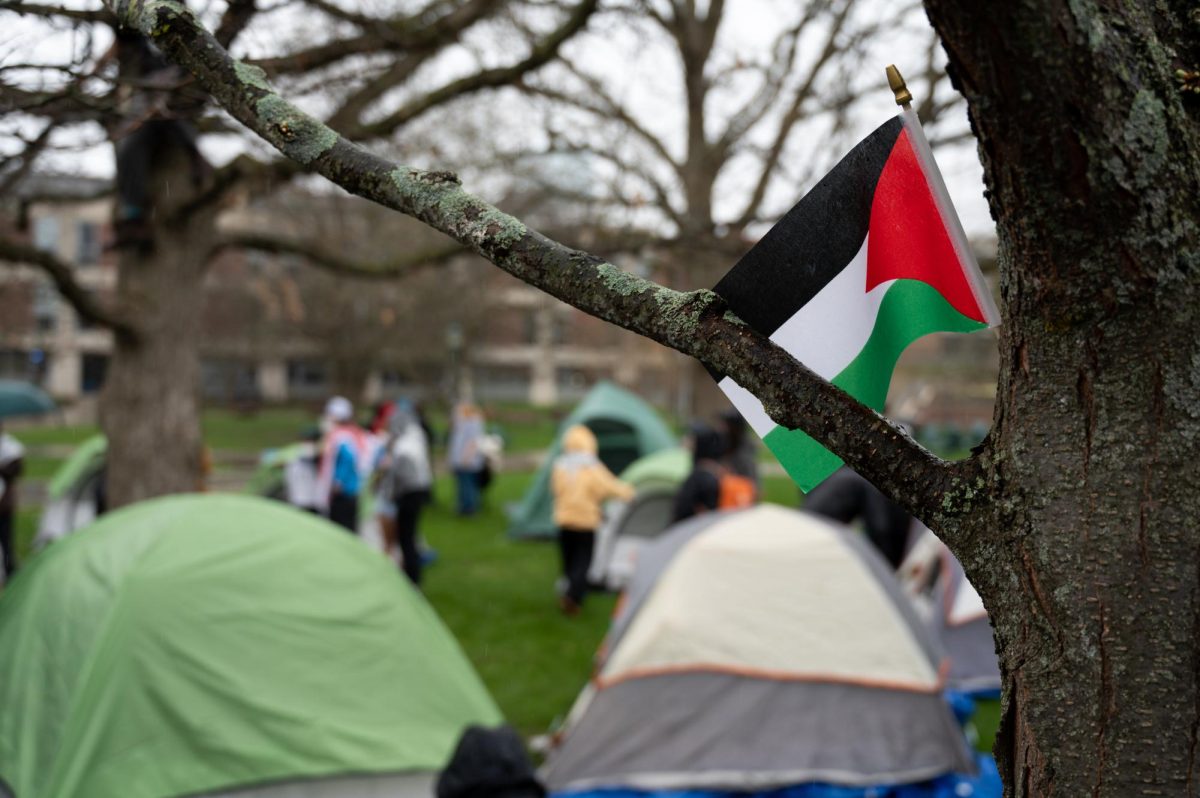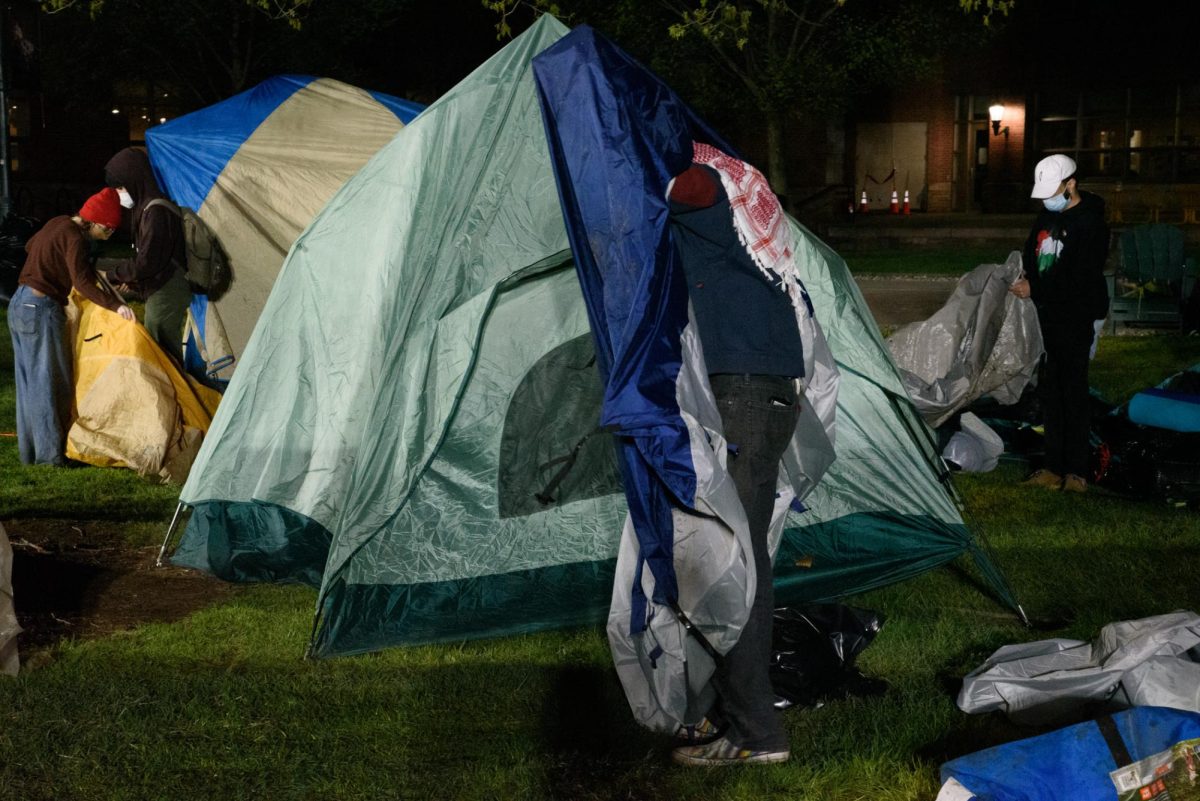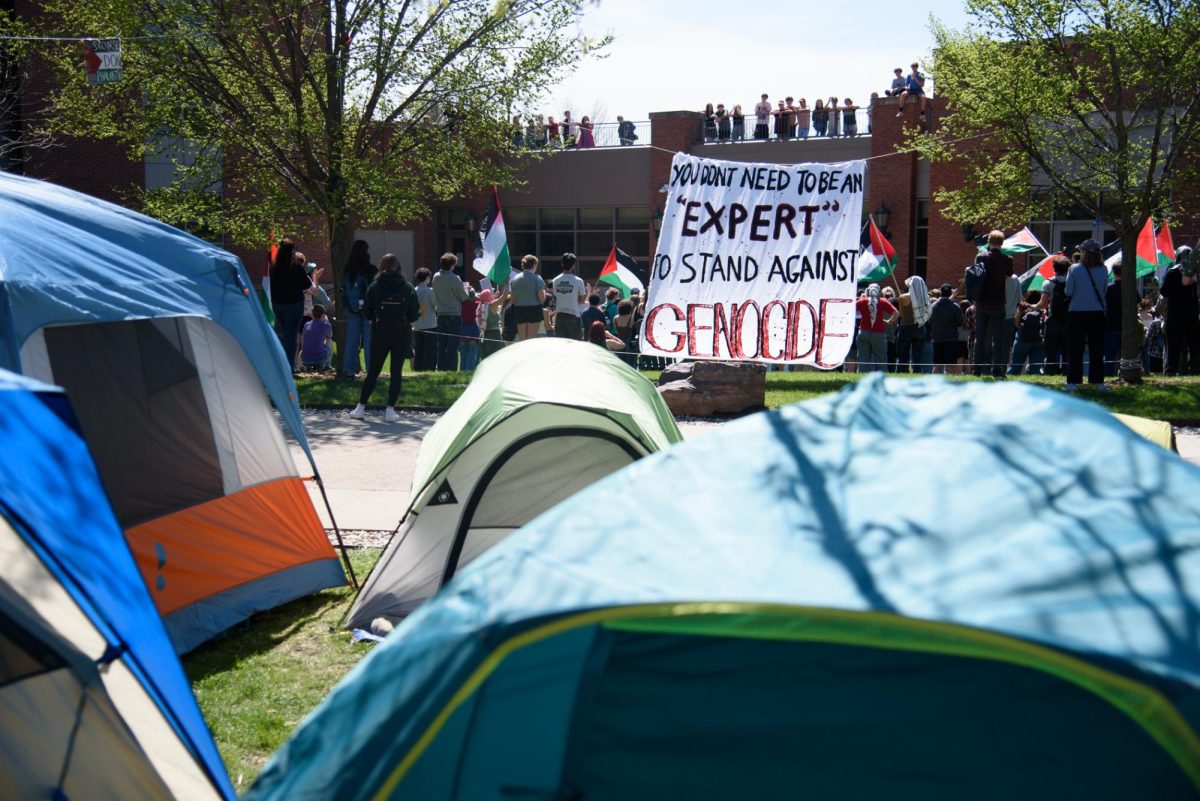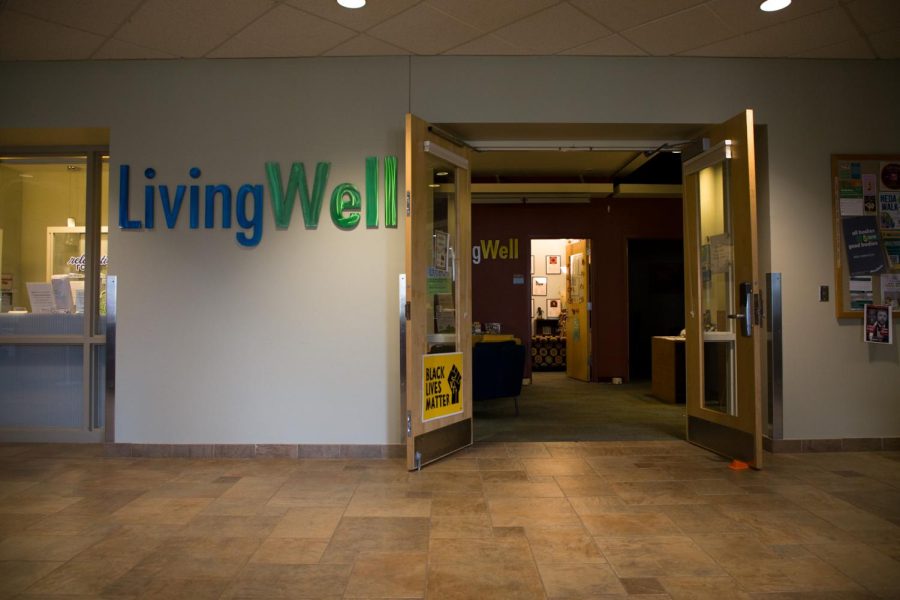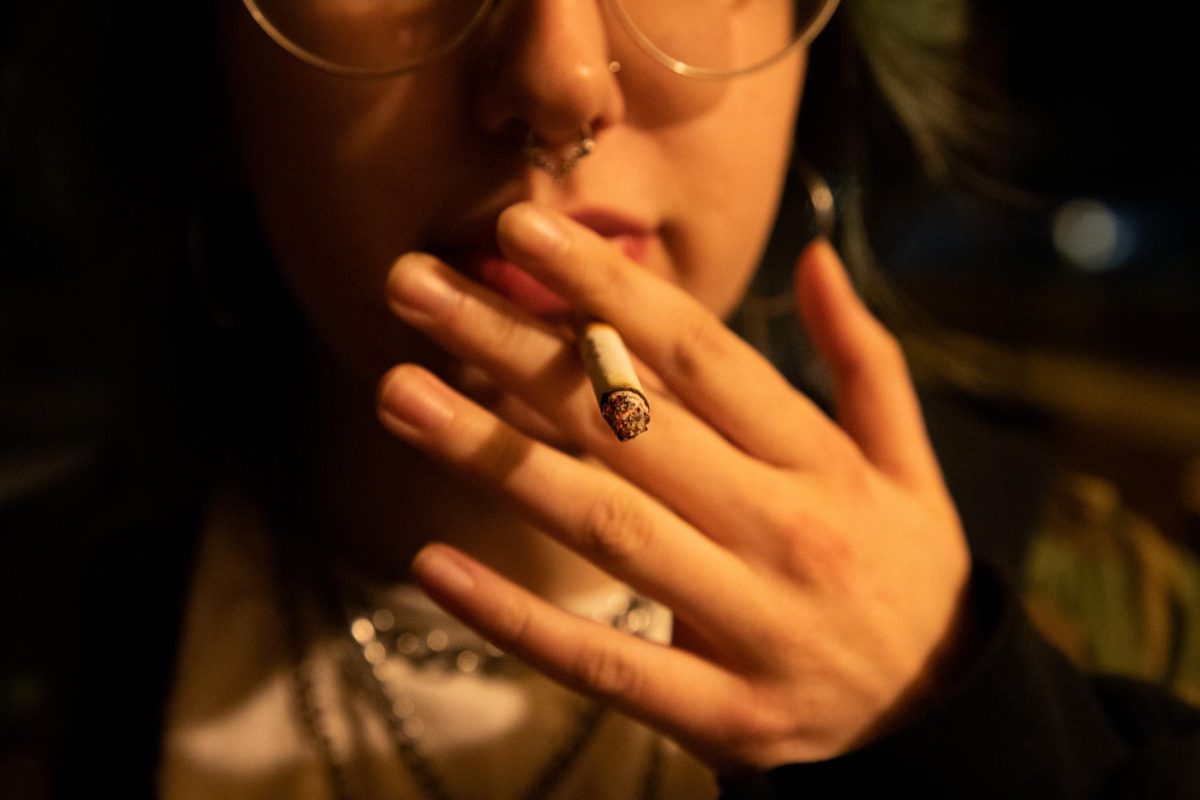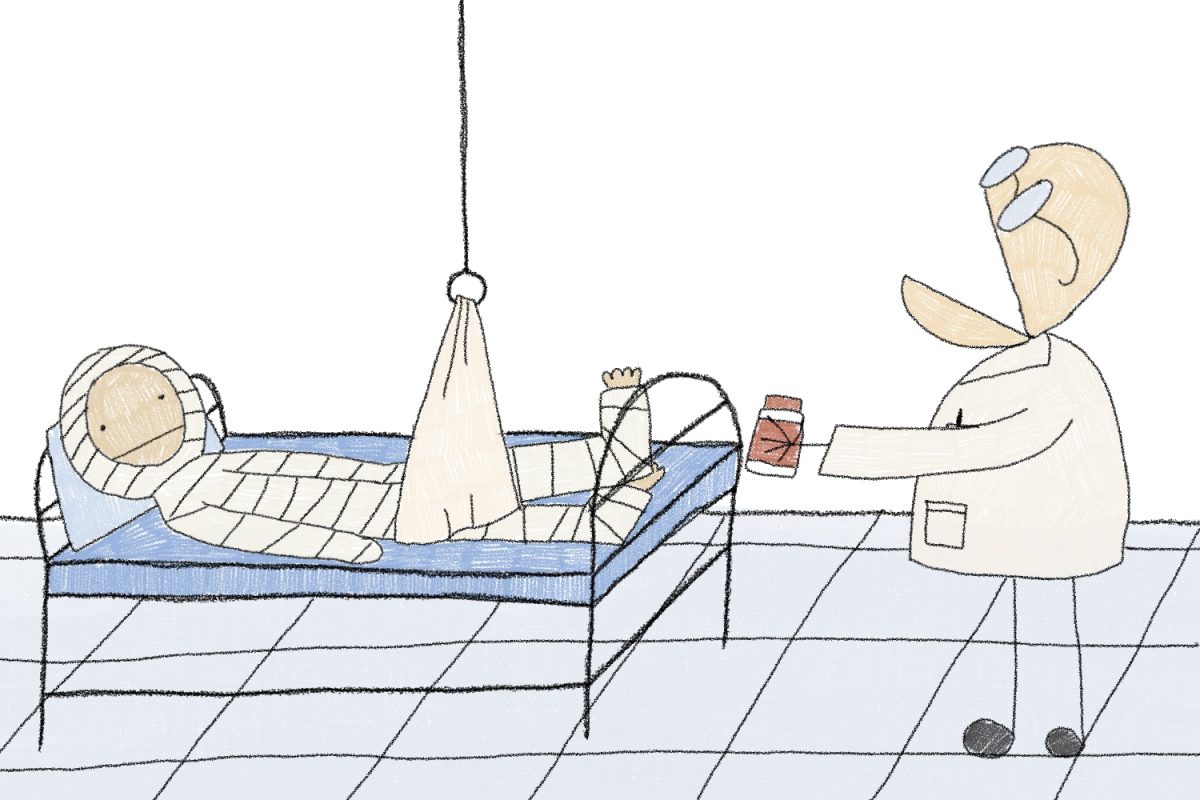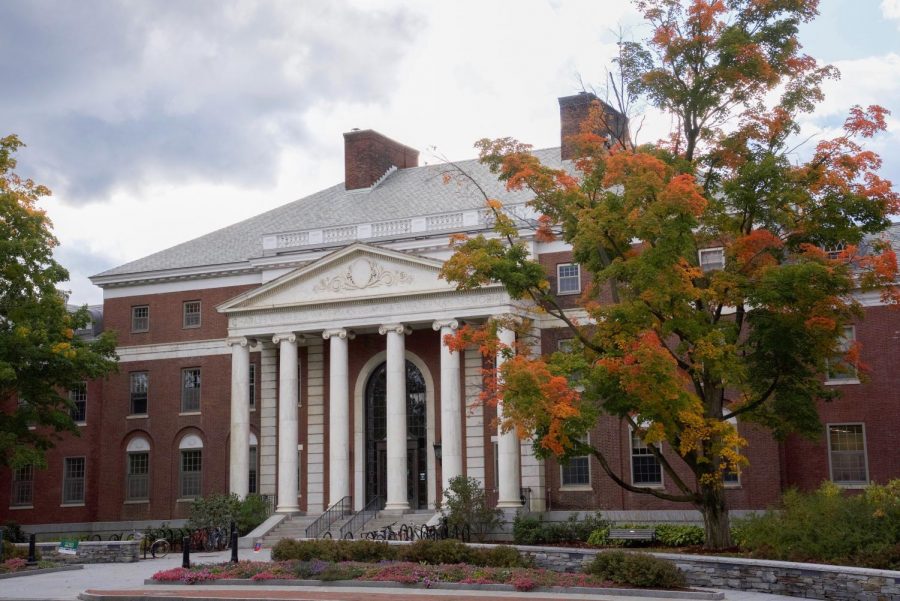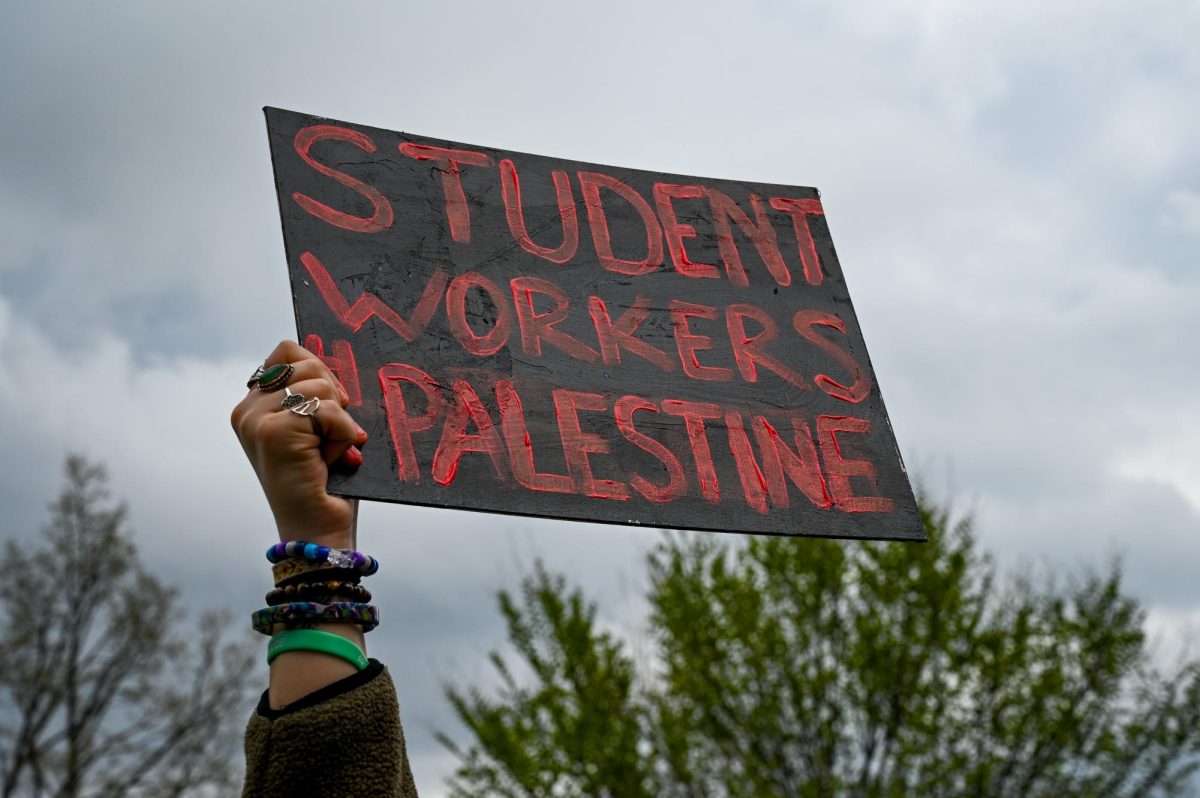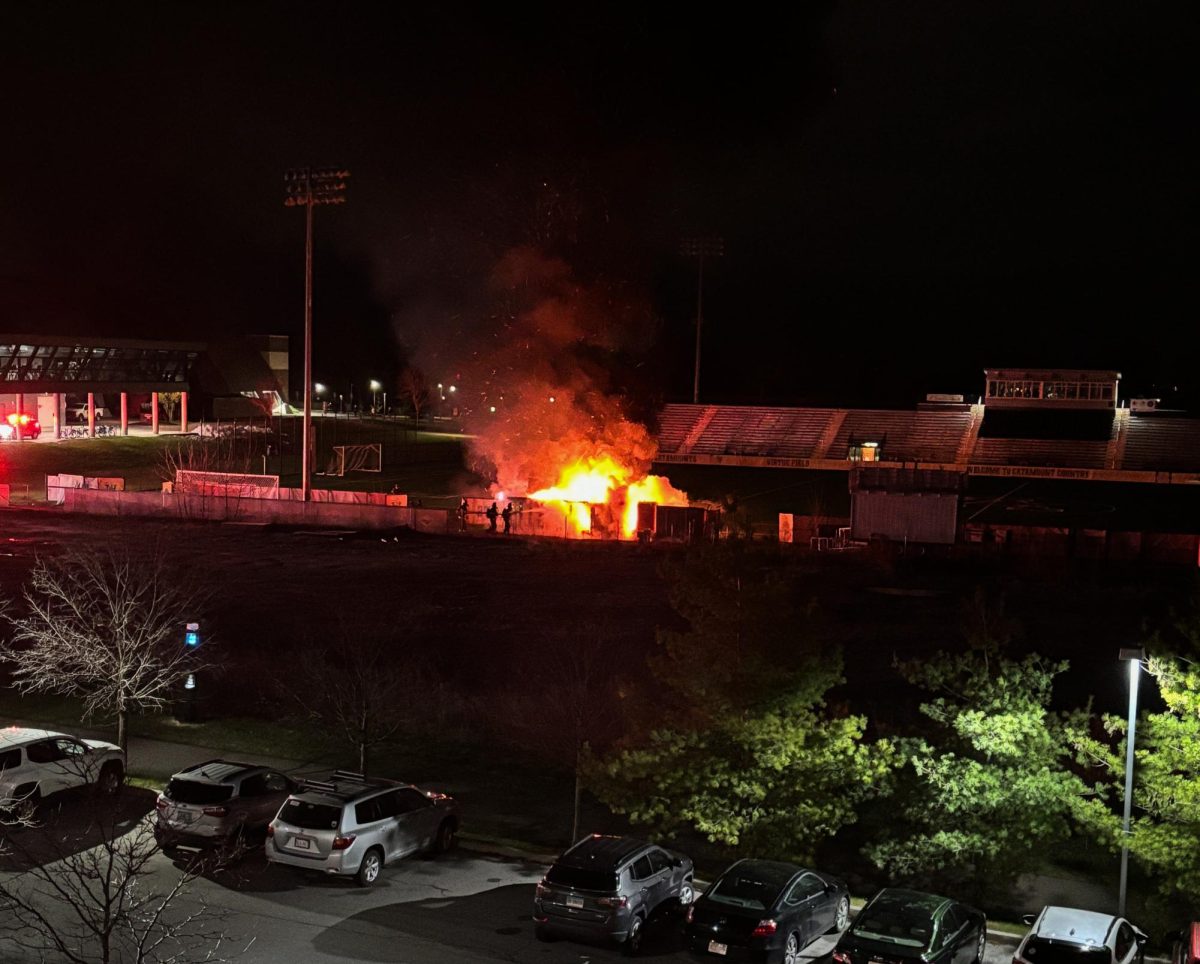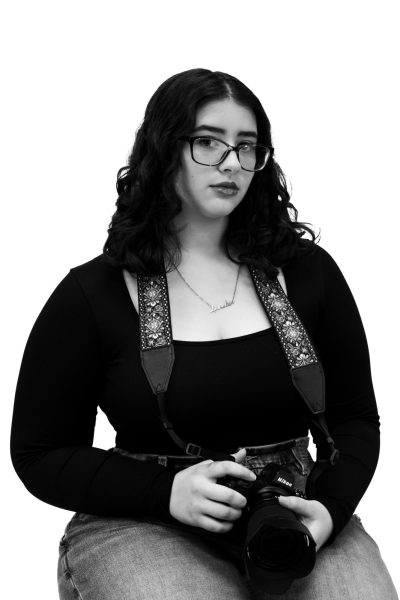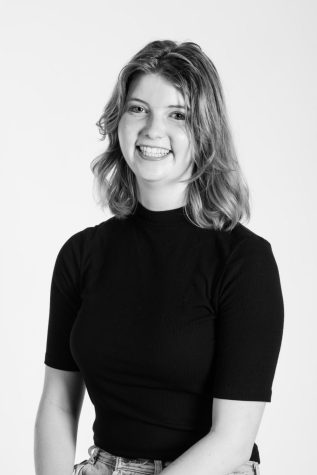This is a live updates page. As events continue to develop, reporters from the Cynic will update this article with encampment and related coverage here.
May 8, 12 p.m.
Protesters began taking down tents in the encampment around 12 a.m., after the floodlights turned on. As of 12 p.m., the central canopy tent, a medical equipment tent and four other tents remain.
“The encampment reached the agreement that it has outlived its usefulness at this exact moment in time,” said James, an SJP organizer. “Taking it down is ultimately the best decision for continuing to hold on to and develop our power as a movement.”
Around 25 protestors in the encampment participated in taking down tents last night.
“To have it all so abruptly end is very strange, but I think the reasoning why is very sound,” said an encampment member. “I have a lot of hope for next year.”
“We saw a mobilization for Palestine in a way that we have never seen on this campus before,” James said. “We have galvanized all of campus to this issue and planted the seeds for a powerful movement that will continue to develop.”
May 7, 10:30 p.m.
On May 7 at 5:30 p.m., the Vermont Coalition for Palestinian Liberation held a rally. The rally began downtown at City Hall, and marched to UVM to support students in the encampment, according to the Vermont CPL Instagram.
“They had an amazing turnout, and we see it as a testament to the broad support that we have from all people in this state on and off campus.” said James, a SJP organizer.
May 7, 6:30 p.m.
In a May 6 email to the Cynic, Adam White, executive director of University communications, sent a statement that was shared with leadership of the encampment yesterday morning.
“The administration has been clear that students are permitted to demonstrate if they do so within university policies,” the statement reads. “The student demonstrators’ persistence in violating university policies makes it difficult for us to sustain discussions about issues important to them.”
The statement addressed all five demands put forth by encampment protestors. It referenced the publicly available list of funds in which the endowment is invested and the cancellation of the commencement speaker for demands one and four, respectively.
Demand 2: “UVM is not considering divestment for any social or political purpose,” the statement reads. “The goal of its investment managers is to help the university meet its fiduciary responsibility to maximize return in endowment to meet the university’s needs long into the future in support of our students, staff and faculty, and our critical research and engagement missions.”
James, an SJP organizer, said, “We think it’s a ridiculous notion that the University has no moral responsibility to ensure that its money is not invested in unethical companies, such as weapons manufacturers or Israeli companies, or companies involved in the occupation of Palestine.”
Demand 3: “UVM will not consider an academic boycott because to do so is a clear violation of the university’s commitment to academic freedom, as articulated by the Faculty Senate in collaboration with university administration and endorsed by the Board of Trustees,” the statement reads.
“We say that this nebulous notion of academic freedom is outweighed by the role that Israeli universities and academic institutions play in upholding the occupation of Palestine. Palestinians have said from day one that Israeli universities are a massive part in upholding the ideological basis for the settler state of Israel,” said James.
Demand 5: “Since the beginning of the demonstration, the university has encouraged students to sound their voice without violating policies, which exist to ensure an environment that is safe and where all community members can engage in their learning and work,” the statement reads. “We have offered guidance on requesting policy exceptions, reminded students that policy violations have consequences, and are now beginning the conduct process for students who have chosen to violate policy.”
“We know that we are part of the long legacy of protests at UVM that the University celebrates today. We reject the notion that because there have been consequences for civil disobedience in the past that that is something the University should knowingly uphold,” said James.
The statement says students can share and exchange ideas with the University through routine meetings with senior administration, Student Government Association and the Graduate Student Senate.
Editor’s note: This article was updated at 10:45 p.m. to include responses from an SJP organizer on the University’s statement.
May 6, 10 p.m.
At 2 p.m., Students for Justice in Palestine held a rally at the Davis Center amphitheater to demand amnesty for student protestors, said James, an organizer with UVM SJP.
“We’re here today, we want to chant loud and clear that we want amnesty and we want more than amnesty,” he said. “We want the University to come to the table in good faith and negotiate with us and we want the University to hear the cry of students to end their complicity in the genocide rather than punishing us for protesting against it.”
Yesterday, the Progressive caucus of the Burlington City Council issued a statement calling for amnesty, James said.
“These city councilors join a chorus of other voices on and off campus, pressuring the University to drop these charges and to come to the table with us,” he said, quoting the statement.
James said a letter to President Suresh Garimella was signed by over 60 UVM faculty members and read it aloud at the rally.
“We ask that you do not escalate the situation through using police or other forms of physical force to silence their voices,” James said, quoting the letter. “Instead we urge you to listen to them and carefully consider their requests which are based on their principle understandings of justice and freedom.”
Ashley Smith, a member of the Vermont Coalition for Palestinian Liberation, also spoke at the rally.
“Your movement here on this campus is part of a national and now international movement of students rising up in solidarity with Palestine,” said Smith.
“As we watch national protests escalate disturbingly, we are hopeful that UVM will be a leader of what is possible on a college campus where dissent, protest and dialogue are protected,” James said.
May 5, 3:30 p.m.
At 8 p.m. May 4, the encampment hosted a screening of “Israelism,” a film about American Jewish attitudes toward Israel. The film’s director was present before and after the screening for a Q&A with the encampment.
The encampment held its general assembly at 10:15 p.m. They spent time addressing how to approach upcoming student policy violation hearings, which will occur on Wednesday, James said.
“Word is about 20 or so students have been notified that they are in violation of policy and seemingly arbitrarily selected,” he said.
They also discussed how to restructure their demands following UVM’s disclosure of their investments.
They also hosted a memorial for the anniversary of the killings of five students by the Ohio National Guard during an anti-Vietnam War protest at Kent State University on May 4, 1970.
“Their legacy lives on as we stand in protest in solidarity with Palestine,” an organizer said.“We are not the first students to be participating in peaceful protest and we will surely not be the last. So just remember who came before you. Remember that we’re inspiring students in the future as well.”
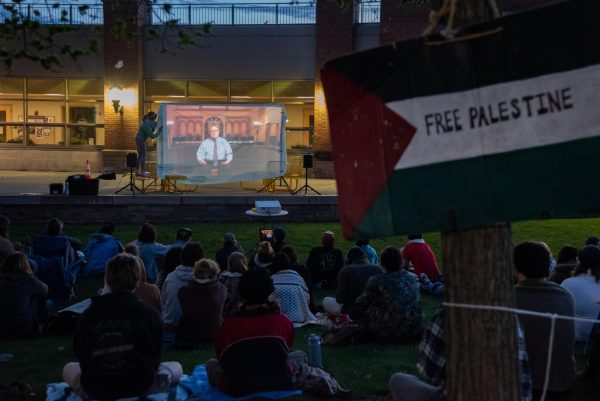
May 3, 6:35 p.m.
In a 5:42 p.m. email to students, UVM President Suresh Garimella made his first public comment acknowledging the encampment, and stated that Linda Thomas-Greenfield, U.S. ambassador to the United Nations, will not be delivering the commencement address.
“I hear you all. I, too, wish for an end to these seemingly intractable disputes and hope that would bring us all some measure of comfort and restore our sense of security and community […] It is with regret that I share that our planned speaker, Ambassador Linda Thomas-Greenfield, will not be joining us to deliver the Commencement address,” he stated in the email.
Part of the email was read live in the encampment.
“I wasn’t expecting this to be honest with you, but this is a testament to our collective power,” said James.
Faculty members in support of the encampment shared their excitement.
“I am deeply relieved that UVM is not going to be shaming itself by celebrating somebody who upholds genocide,” said one faculty member.
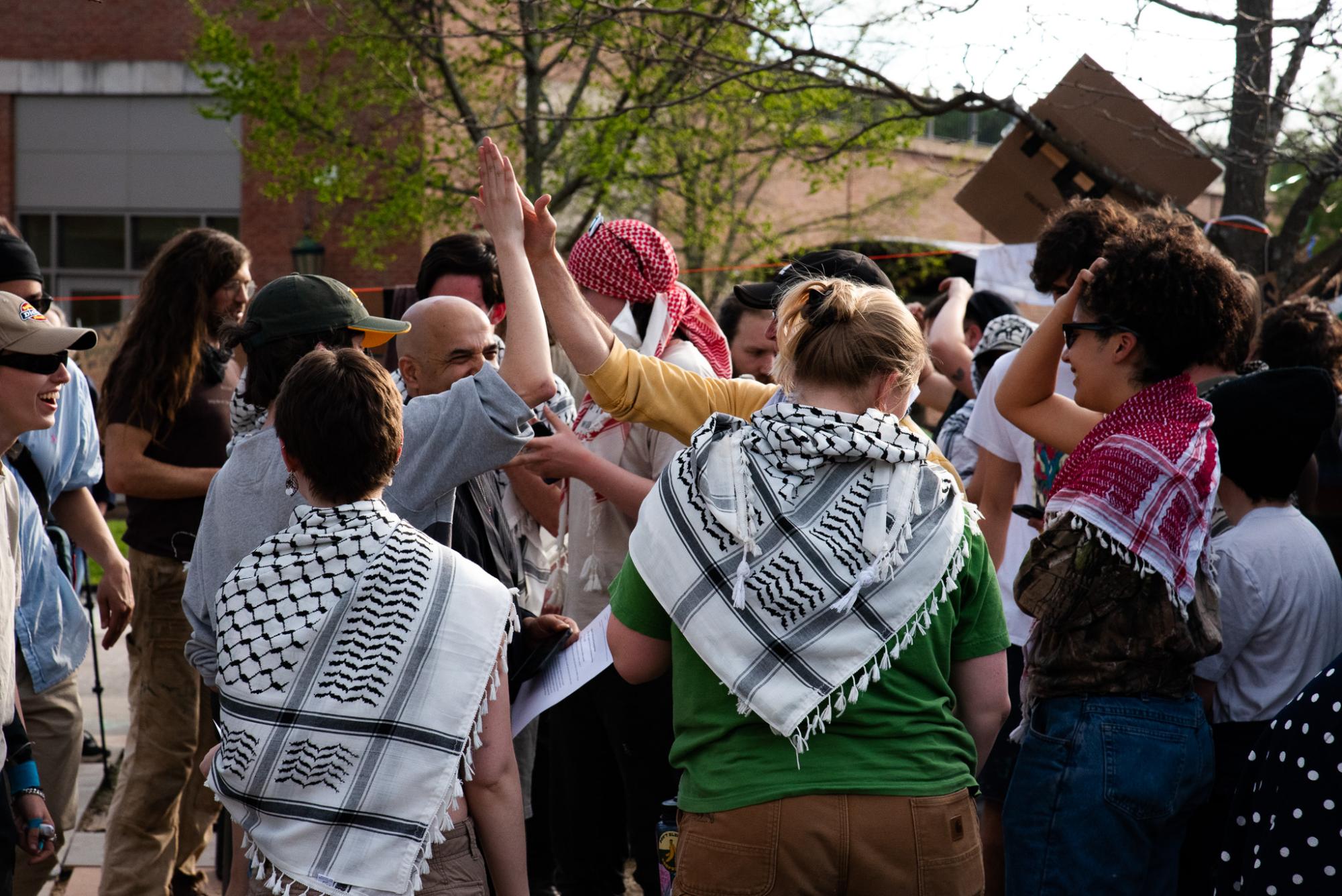
May 3, 5:30 p.m.
Around 2:30 p.m., UVM Police Services and administrators, including Student Life leadership Lina Balcom and Jerome Budomo, entered the encampment and again began asking those present to identify themselves, said Pansy, a student present at the encampment.
People were generally compliant with the orders, Pansy said.
While administrators were present in the encampment, protesters marched around the encampment chanting, “Admin is not welcome here.”
“We came outside today to reiterate to the students who are protesting at the encampment that there are policy violations that the University is concerned about,” said Lina Balcom, director of Student Life. “We have asked them to come into compliance with the policy violations a number of times this week, both in writing and in conversation.”
Balcom said that the consequences will not be uniform for all those involved in the encampment.
By 3:15 p.m., administrators and police had left.
May 3, 5 p.m.
Several officers from UVM Police Services and administrators, including Student Life leadership Jerome Budomo and Lina Balcom, arrived at the encampment around 9:30 a.m. They distributed printed notices informing encampment protesters of the University’s policies regarding demonstrations.
Anyone present at the encampment who refused to identify themselves would be treated as a trespasser and required to leave campus, the notice stated.
Administrators and police asked those present at the encampment for identification and people were generally compliant with these requests, a student organizer, who identified himself as James, said.
At 12 p.m., the encampment gathered for a general assembly.
“They asked people for their IDs,” said James. “They said if you are not a student here, you will be [trespassing] and then you will potentially face arrest.”
Adam White, executive director of University communications, stated in a May 3 email to the Cynic that the formal student conduct process had begun today for several students.
“This is only after numerous warnings were issued to students throughout the week,” White stated. “Initiation of the process is ongoing and each student will receive a fair process before final sanctions are determined.”
During the general assembly, James said that administrators have said they do not want to conduct an encampment sweep.
“They keep saying we don’t want this to go the way of the other universities with police crackdowns,” he said. “They want to resolve this through negotiations.”
Protestors in the encampment discussed how to respond if another ID check occurs. An organizer present at the general assembly shared a jail support hotline phone number and asked protestors to write the number on their body.
May 3, 11 a.m.
Around 8 p.m. May 2, UVM healthcare workers led a vigil for lives lost in Gaza, marching from the UVM Medical Center to the encampment.
They read the names of healthcare workers that were killed by the Israeli Defense Forces as they walked.
“We gather with you today in solidarity. We feel so grateful to be sharing space with all these incredible students and recognize their moral clarity and courage in this moment. And we’re honored to stand with you as healthcare workers,” said Dr. Anisha Rimal, a doctor at UVMMC.
They led a teach-in to explain the health crisis in Gaza.
“So imagine going about your day and now take away reliable electricity, take away sufficient antibiotics, take away anesthesia, clean water and enough food,” said a doctor.
Following the vigil, around 8:45 p.m., the encampment gathered for a general assembly.
“We need to center Palestine and everything we do,” a Palestinian organizer said. “We’re not just some like imaginary thing or creature that’s somewhere else in the world. There’s Palestinians here in this camp.”
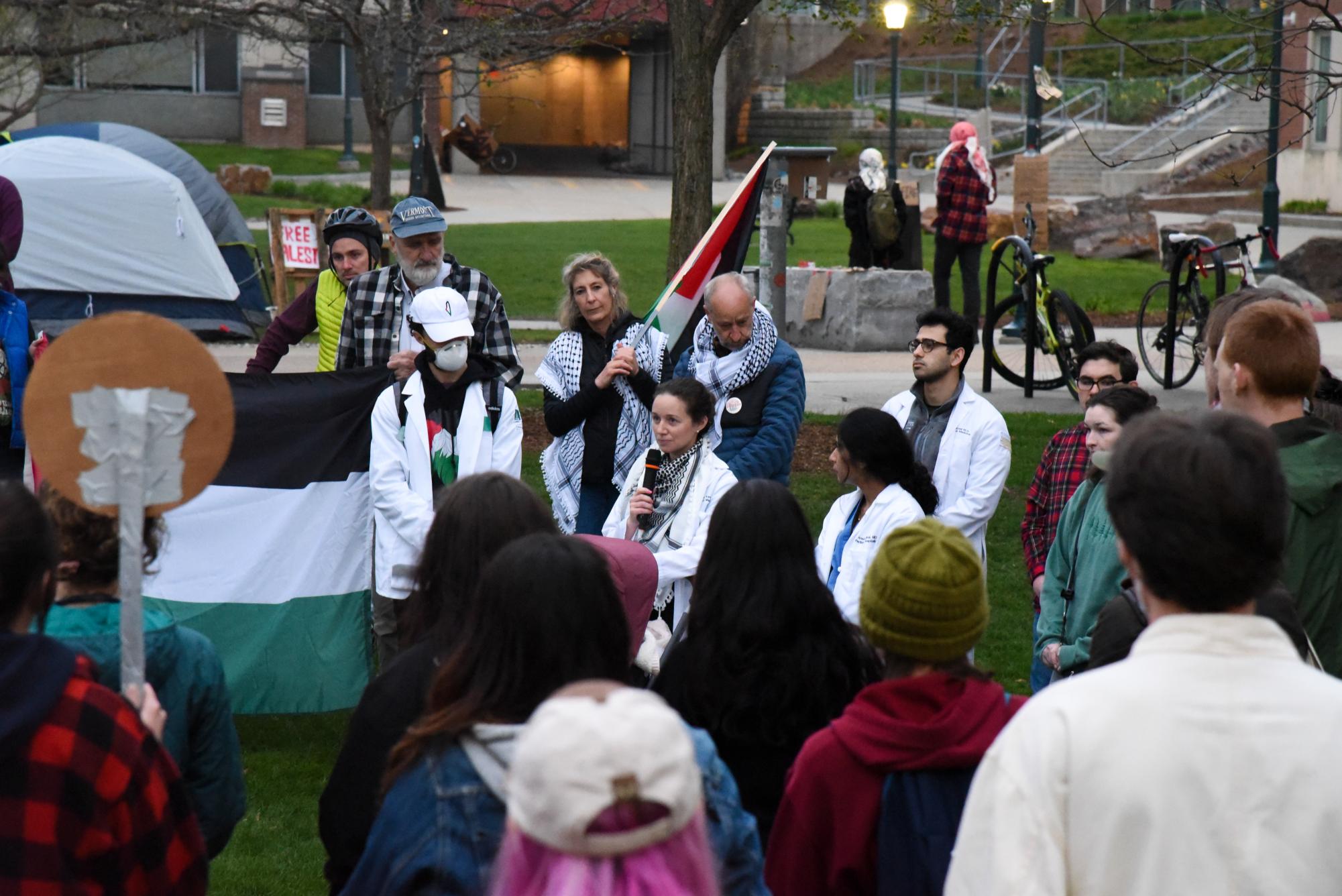
May 2, 6:30 p.m.
At 4:30 p.m, organizers held a Q&A with an alumni activist on protest movements.
“We need to take up as much space as possible,” the alum said.
A second activist was present at the Q&A to share their Occupy movement experience and advice for the protestors in the encampment.
“The more of us who do it together at the same time, the better,” they said. “And an encampment is a really powerful tactic for bringing all of that individual power into a collective, physical space.”
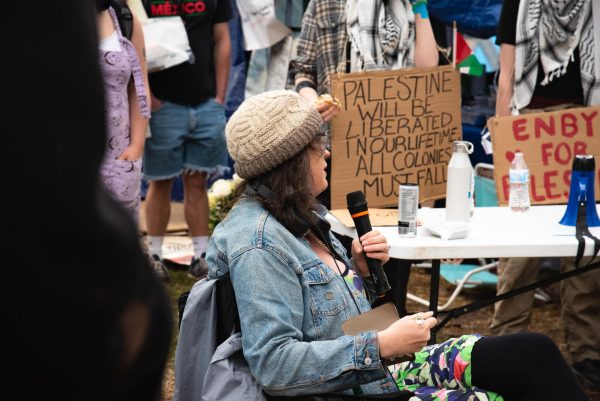
May 2, 4:00 p.m.
At 1:00 p.m., Students for Justice in Palestine held a rally on the Howe Library steps.
“We are satisfied to announce that the University has agreed to our first demand,” said James, an organizer with Students for Justice in Palestine.
“When we came here on day one they were afraid, they were threatening us, they were saying we have to pack up immediately or we would face consequences,” James said. “What did we do? We stayed.”
Student workers held a walkout in order to disrupt business as usual and show solidarity with the encampment, according to a Davis Center employee who spoke at the walkout.
The SJP rally moved to the Davis Center amphitheater and was joined by the student workers walkout.
“The show does not go on without us, and today it will not,” the Davis Center employee said.
Student workers spoke at the rally, as well as speakers from SJP and UVM Staff United.
“The purpose of this protest and this walkout is to demonstrate the power that students and staff have in this school,” the Davis Center employee said. “It is astronomical.”
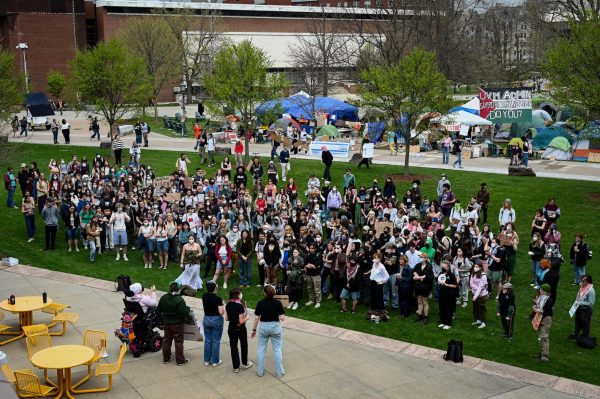
May 2, 2:30 p.m.
At 11 a.m., organizers led a teach-in titled “Debunking Zionist History.”
The teach-in was intended to debunk the idea that criticism of Zionism is inherently antisemitic, said the anonymous speaker.
“There has been an intentional effort to say Zionism is what Jews are—and prior to the Holocaust, that was really not the belief of the majority of Jewish people,” they said. “To remove this historical context and say, ‘this is just always what’s decreed by the religion of Judaism,’ is just inaccurate.”
May 2, 2:00 p.m.
Around 9 p.m. May 1, the encampment gathered for a general assembly. Organizers said that while there were no major advancements in negotiating the protesters’ five core demands with administration, conversations are ongoing.
“We don’t want to get too optimistic here, but it could be going a lot worse,” said James, an organizer with Students for Justice in Palestine.
James said that Patricia Prelock, provost and senior vice president, told organizers she would work on arranging a meeting between encampment protesters and the board of trustees.
In response to a question about such a meeting, Adam White, executive director of University communications, stated in a May 2 email that conversations will continue.
“Concerns expressed by participants in the demonstration are being conveyed to University leadership,” White stated.
Following negotiations announcements, students read aloud international news updates regarding Palestine.
“I think it’s really important that we all remember that while we are here for the University and for them to meet our demands, we’re here in solidarity with the folks who have been attacked for about 100 years now,” an organizer said.
May 1, 6 p.m.
On April 30, SGA passed a resolution denouncing the choice of Linda Thomas-Greenfield, U.S. ambassador to the United Nations, as the 2024 commencement speaker, according to a May 1 Instagram post from SGA.
“BE IT FURTHER RESOLVED, the SGA urges UVM administration to cancel Linda Thomas-Greenfield’s speech as well as the honorary degree she would receive,” the resolution stated.
The resolution said Thomas-Greenfield oversaw U.S. vetoes of a humanitarian pause in fighting on Oct. 18, 2023, a resolution for immediate humanitarian ceasefire in Gaza on Dec. 8, 2023 and again on Feb. 20, and the admission of the state of Palestine to the United Nations on April 18.
“LET IT BE KNOWN, that the SGA views Linda Thomas-Greenfield speaking on our campus as unethical and insensitive to our Palestinian, Muslim, and Arab communities, which is in direct violation of UVM’s Common Ground and commitment to diversity, equity, and inclusion,” the resolution stated.
SGA is committed to ensuring commencement is a time of celebration for the graduating class and not an event that brings distress to any communities of students, the resolution stated.
In another May 1 Instagram post, SGA said it supports students on the Andrew Harris Commons using their First Amendment right to demand change from the University.
“To the UVM Student Body, please know that SGA is committed to doing everything in our power to protect our students’ right to demonstrate without fear of arrest or suspension,” the second post stated.
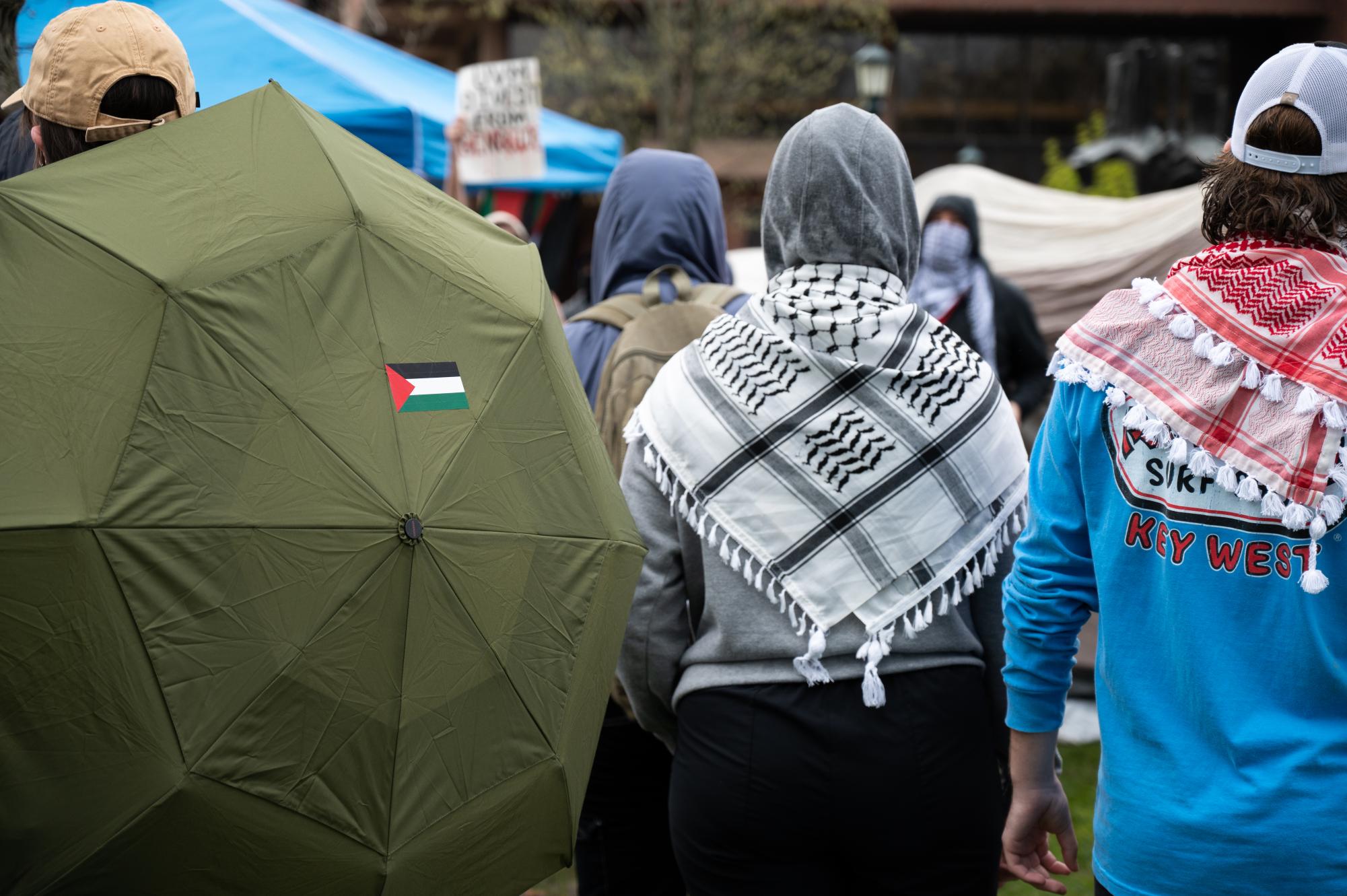
May 1, 11 a.m.
UVM administration has agreed to release a summary of endowment investments by the end of the week, SJP stated in a May 1 Instagram post.
“The University has been working on a plan to provide a summary of the investments of our endowment for some time,” stated Patricia Prelock, provost and senior vice president, in an April 30 email to the Cynic. “Our goal is, hopefully, to have those ready by the end of the week as we prepare for our upcoming board meeting in May.”
April 30, 7 p.m.
Around 5:30 p.m., a Jewish speaker from Jewish Voice for Peace led a shared a talk and answered questions on the foundations of modern day Zionism.
“The status of the Jew as an ‘other’ was ever more perilous and this was the kindling for the fire we see in Palestine today. A toxic mixture of European Jewish trauma with European colonial ideology,” said the speaker.
He discussed the Nakba and its importance in the history of Israeli occupation.
“And in recent decades, [the Nakba] has been confirmed by Israeli historians using Israeli government documents and revealed to have been at least in part a planned effort of ethnic cleansing to ensure a clear Jewish majority in the nation state,” he said.
The speaker was accompanied by a Palestinian man who shared stories of Gaza and called for liberation.
“And if anyone wants to subjugate other people and dominate, they are not for humanity,” he said.
A member of Jewish Voice for Peace shared their experiences on campus.
“And I have never felt unsafe on campus as a Jewish person because I’m Jewish,” said Mallory Seegal, a graduate student at UVM. “It’s when I have felt unsafe on campus it’s because I’m an Anti-Zionist Jew.”
April 30, 4:30 p.m.
At 2:35 p.m., UVM Police placed barriers at multiple entrances to the Andrew Harris Commons.
Officer Mike Winters said the barriers are a precaution to protect those participating in the encampment.
“Whenever we have large publicized gatherings, these barriers go up to minimize the risk,” he said.
Adam White, executive director of University communications, said that the University is continuing to assess the situation and supports students speaking up.
“It’s a fundamental part of higher education to have varying viewpoints and voices represented,” he said at the protest. “That is the only healthy scenario, to have everyone’s viewpoint and voice represented. It has to be done respectfully, it has to be done safely.”
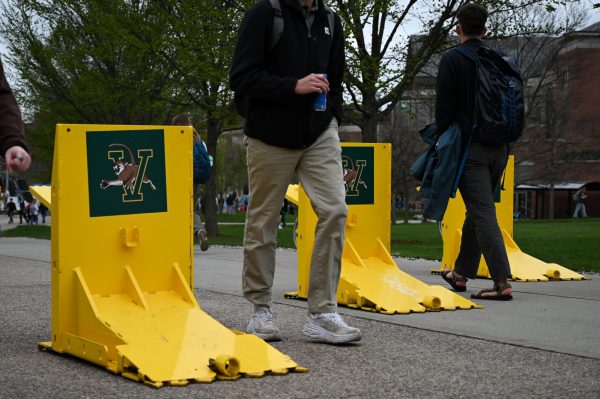
April 30, 4 p.m.
Some Jewish students present at the Andrew Harris commons have expressed concern over the encampment.
“This encampment is so harmful to the Jewish people,” said first-year Lexi Sussan, co-president of Students Supporting Israel. “Signs like ‘from the river to the sea’ [are] calling for the annihilation of Jewish people from that entire strip of land which is Israel.”
Sophomore Max Abrahams said that he is watching the encampment as a concerned Jewish student.
“Well, I’m Jewish, he said. “This is full of antisemitism. I can’t just sit down and let it happen.”
Hillel Executive Director Matt Vogel offered Hillel as a safe place for Jewish students, he said.
“I listen to what Jewish students are telling me and they feel afraid. That’s what Hillel’s job is—to reflect and amplify what students are saying,” he said.
“I plan to be peaceful. I want to have conversations with people who want to talk about it. There are definitely two sides to this story,” Sussan said.
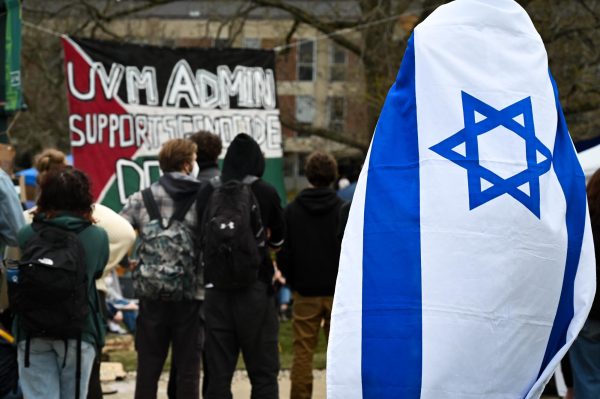
April 30, 12:30 p.m.
Around 8:45 p.m. last night, employees with the Department of Student Life passed out notices to students at the encampment that informed students of UVM policy regarding student protests and potential repercussions for encampment protesters.
“Students and student organizations suspected of University policy violations are subject to the University’s student conduct process. Those processes are currently underway and will continue until the demonstration is brought into compliance with University policies,” the letter stated.
“It is our sincere hope that it will not be necessary to initiate conduct cases beyond those related to the initial and continuing improper use of campus grounds,” the letter continued.
Though he was unsure of the total number of protesters who slept at the encampment overnight, an organizer said that the number had grown.
The camera between the Howe Library and the encampment remains up.
Police turned on floodlights at the encampment around midnight, a protester said.
“Two police cars pulled up and three police officers got out and they came over and they turned on the floodlight,” an anonymous first-year said. “It was just really bright and really loud.”
Around 8:15 a.m., the encampment gathered for a general assembly. Organizers provided general safety reminders, as well as updates on negotiations with administration.
Ellen Kaye, co-president of UVM Staff United, spoke at the morning assembly. Yesterday, UVM Staff United declared their support of encampment protesters, Kaye said.
“After hearing from members, we declare unequivocal support for our students’ safe expression of their freedoms of speech and assembly,” she said. “We would find police or administrative action against peaceful demonstrators to be inappropriate and out of line with this University’s ‘Our Common Ground’ values.”
A protester announced plans for teach-ins later today on UVM’s endowment finances, and de-escalation training. Sociology Professor Jon Shaffer and students from the UVM Larner College of Medicine will also lead a teach-in on the public health crisis in Gaza, they said.
Organizers have a meeting scheduled with Patricia Prelock, provost and senior vice president, later today, an organizer said.
“My goal is to listen to the students’ concerns and to find a path forward for students to protest within the expected university policies. I want to ensure all students on our campus are safe with little disruption to their learning,” Prelock stated in a April 30 email to the Cynic regarding the meeting.
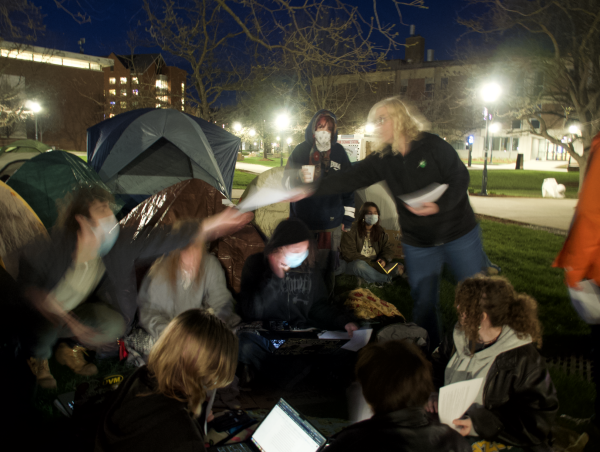
Editor’s note: This article was updated at 2:35 p.m. to include comment from Patricia Prelock.
April 29, 8:30 p.m.
In a 5:36 p.m. email, the first to students regarding the encampment, Patricia Prelock, provost and senior vice president, stated the University administration has been in contact with the protestors and were made aware of their demands.
“Reflecting on last evening’s conversations it is clear to me that the demonstrators and the administration share many of the same interests—to ensure the safety and well-being of all students, to value free expression, to create space for diverse opinions, to provide an inclusive environment for all identities, to honor the value of human life, and to mourn the loss of life,” the email stated. “We don’t disagree on any of these key points.”
Prelock’s email also stated that while the University encourages students to engage in free speech, violations of University policy will be enforced.
“We will follow our policies,” the email stated. “Violations, including discrimination and harassment will result in referral to the student conduct process.”
The email was read live in the encampment. Student organizers said that her statement did not address their listed demands.
Student organizers held a general assembly of the encampment at 6 p.m.
The organizers gave students guidance on de-escalation with police and possible outside agitators. They also plan on running trainings for people to become police liaisons and media liaisons.
“I am a Palestinian community member, my family is originally from Haifa,” said Nour El-Maboulsi. “And I just want to say from the bottom of my heart, from my family and from my ancestry, thank you.”
“You are not on the right side of history, you are history […] I’ve waited for this moment my whole entire life.”
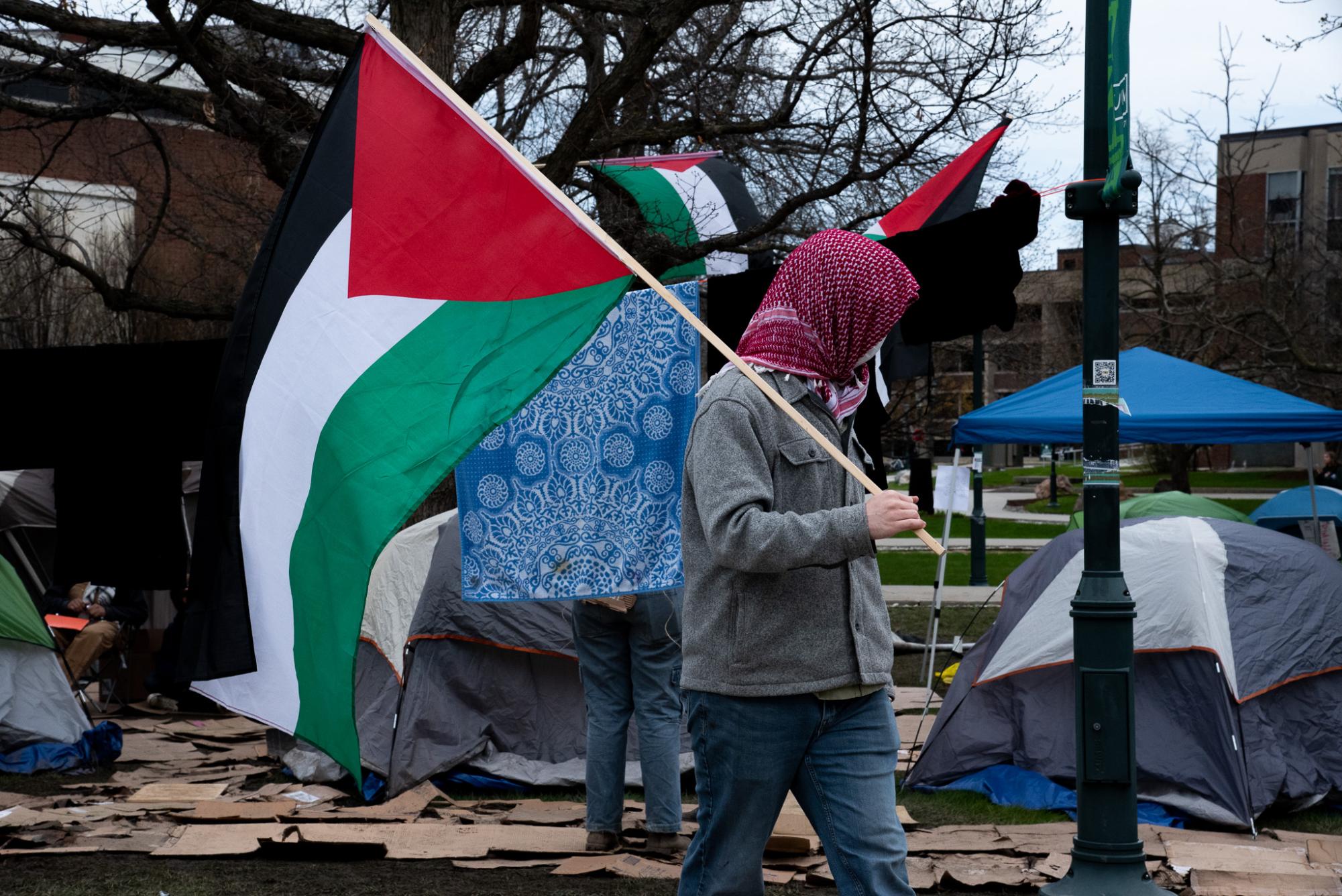
April 29, 5:57 p.m.
The Cynic has received the following statement from the office of Burlington Mayor Emma Mulvaney-Stanak:
“I have engaged with student organizers and I appreciate their commitment to peaceful protest, which is a critical part of all educational communities. I have also been in close communication with UVM leadership, and I am grateful that they are prioritizing student safety. My office will continue to stay informed.”
April 29, 3 p.m.
UVM Police services set up a LVT Solar camera between the Howe Library and the encampment.
Deputy Chief Jason Lawson said that the camera allows UVM police an opportunity to provide safety for those in the area.
“This tool, it just provides safety for everyone in the area,” he said. “So if something happened, it would give us an opportunity to try to follow up with some source of material that could provide better avenues of trying to investigate what happened.”
The camera does not use facial recognition technology, which is illegal in Vermont, Lawson said. Section 14 of Act No. 166 (S.124) includes a moratorium on facial recognition technology.
“Until the use of facial recognition technology by law enforcement officers is authorized by an enactment of the General Assembly, a law enforcement officer shall not use facial recognition technology or information acquired through the use of facial recognition technology unless the use would be permitted with respect to drones under 20 V.S.A. § 4622,” the act states.
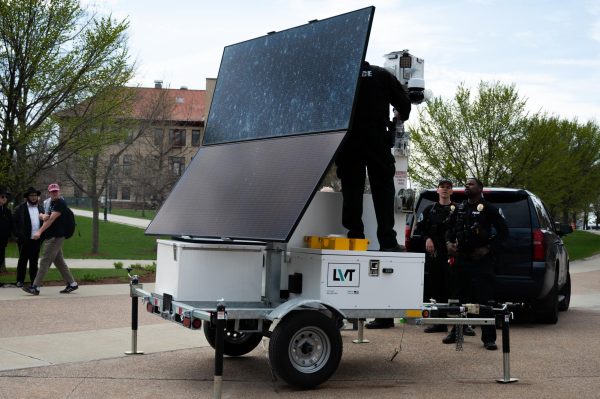
Editor’s note: This story was updated at 5:46 p.m. to include additional information from Lawson. Additionally, this story was updated at 1:34 on April 30 to add a missing graf.
April 29, 2 p.m.
At 1:08 p.m., a group formed on the steps of the Howe Library to protest the upcoming commencement speaker, Linda Thomas-Greenfield.
“For those who don’t know, Linda Thomas-Greenfield is the United States Ambassador to the United Nations. She has vetoed three ceasefire resolutions at the UN. She is also coming to talk here at UVM,” said a student leader.
“Shame,” the crowd replied.
Wafic Faour, a member of Vermont Coalition for Palestinian Liberation addressed the crowd.
“We have to remember that each university, every one, in Gaza has been destroyed. Israel is purposely going after Palestinians and their education system where over 320 schools have been destroyed,” Faour said.
The rally moved towards the Davis center and speakers stood on the stage.
A senior spoke in concern for the University’s supposed support for diversity, equity and inclusion and its association with Thomas-Greenfield.
“Her decisions to vote down ceasefire resolutions again and again–that’s what cultivates the environment of hate that allows for the shooting of three Palestinian men down the street from us,” she said. “It’s an antithesis to everything that university claims to be about.”
UVM faculty joined, and spoke alongside SJP leaders in solidarity with student protestors. Professor Helen Scott addressed students who were in support of the protest.
“You [the students] have been writing letters, finding petitions, marching, rallying and doing everything that you can to use your civil rights to stand up against these atrocities. And now you’re taking it to the next level because nobody seems to be listening,” she said.
She also showed support against the commencement speaker.
“You are the ones that should be honored by this university. You should be our commencement speakers. And there are many more faculty who are behind you and we want you to know that we have your back,” she said. We defend your right to peacefully protest. We are listening to your voices and we will support you in every way that we can.”
“Ambassador Linda Thomas-Greenfield is one of the nation’s most accomplished diplomats, and the University has been looking forward to celebrating her outstanding contributions in national service since she agreed last summer to speak at this year’s commencement,” stated Adam White, executive director of University communications, in a April 29 email.
SJP leaders finished the rally by reminding protestors of their five goals, and reminded students to remain in the encampment.
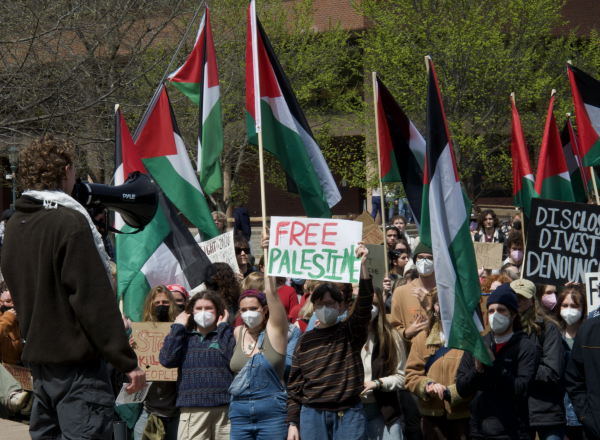
Editor’s note: This article was updated at 3:22 p.m. to include the name of the professor who spoke at the protest.
April 29, 12:30 p.m.
Protest activities started up again this morning at 8 a.m., with organizers providing breakfast and snacks to the protesters who continued the encampment overnight.
UVM SJP held another general assembly meeting to discuss their plans for the day.
Protesters organized an “art build,” making new posters, painting rocks and covering the sidewalk with chalk.
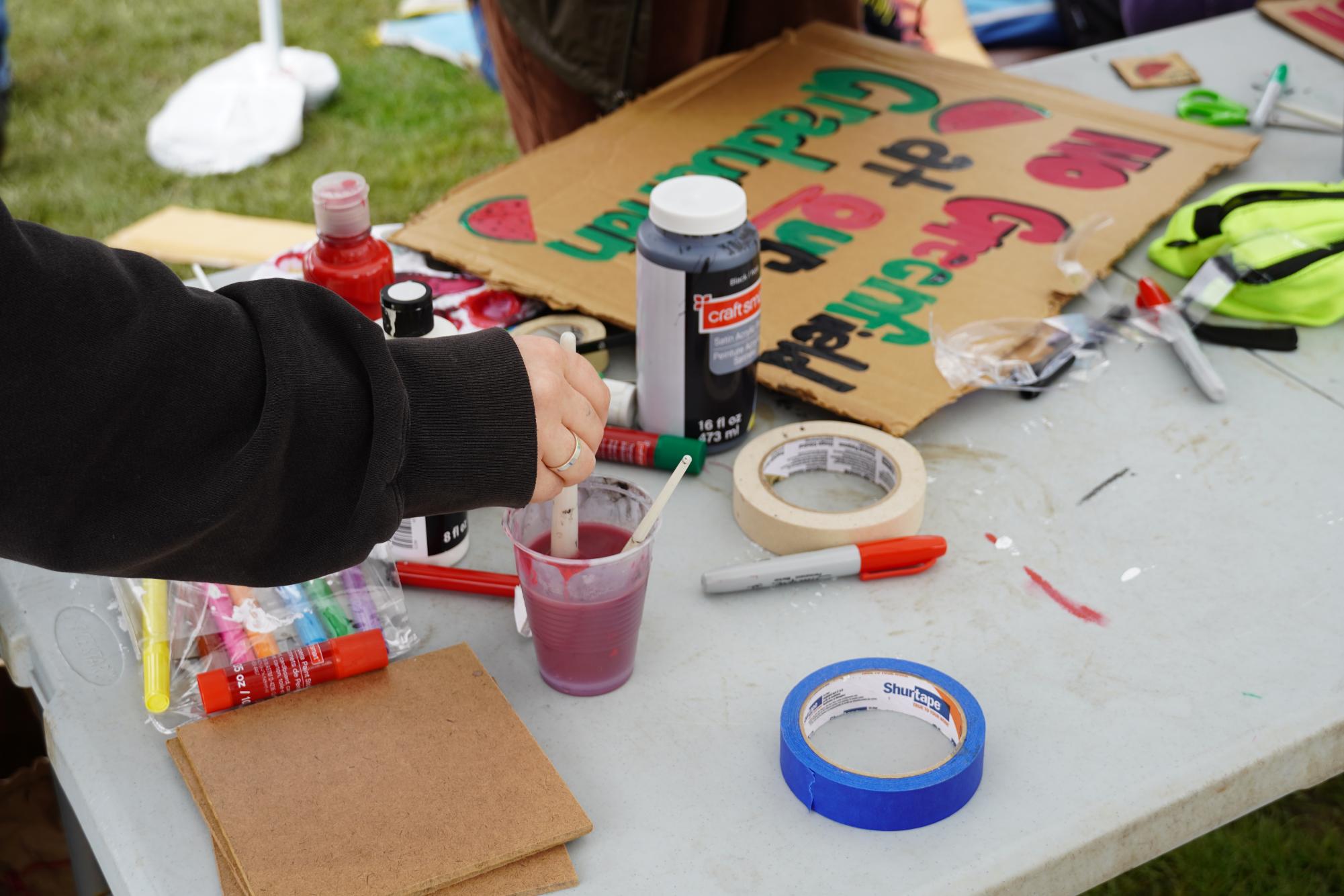
Organizers lead chants as students passed by walking to class.
“Disclose, divest, we will not stop, we will not rest,” the protesters chanted.
One student organizer with a megaphone read excerpts from Rifqa, a poetry book by Mohammed El-Kurd as students passed by walking to class.
Students continue the encampment, some doing homework in chairs surrounding the grounds.
“We are hopefully opening up the door for some good faith negotiations with administration about our demands, but we’ll see what happens,” said an anonymous leader of SJP.
A protest will begin at 1 p.m. on the Howe Library steps to protest UVM awarding Linda Thomas-Greenfield with an honorary degree and allowing her to deliver the class of 2024 commencement speech, according to an April 29 Instagram post from UVM SJP.
April 28, 9:20 p.m.
At around 8 p.m., UVM SJP organized a general assembly meeting to discuss the status of the encampment.
“The police have been telling me that if we don’t take the tents down they’re gonna come in and collect everybody’s IDs,” said David, a student organizer for SJP.
The protesters booed in response.
“Michael Schirling said he’s gonna suspend us,” David said. “He said we have 30 minutes to leave, approximately six hours ago.”
The student organizers then discussed their list of demands for the UVM administration: disclosure of UVM investments, divestment from all companies involved in the occupation of Palestine, an academic boycott of Israeli institutions, cancel Linda Thomas Greenfield’s commencement speech, and amnesty for all students engaged in the protest.
Protest activities will be continuing tomorrow morning.
April 28, 8:00 p.m.
A seder meal and prayers began at 6:30pm.
Haggadot and plates with traditional seder food were distributed by Jewish Voices for Peace Chittenden County.
Leaders told the crowd the traditional Passover story, and they followed along in the Haggadah.
“Moses proposed that Pharaoh free the Jews with as little fuss as possible. Pharaoh of course said no and peaceful negotiation ended,” said a leader of JVP.
The services broke at 7:40 p.m. as the organizers shared a meal with the crowd.
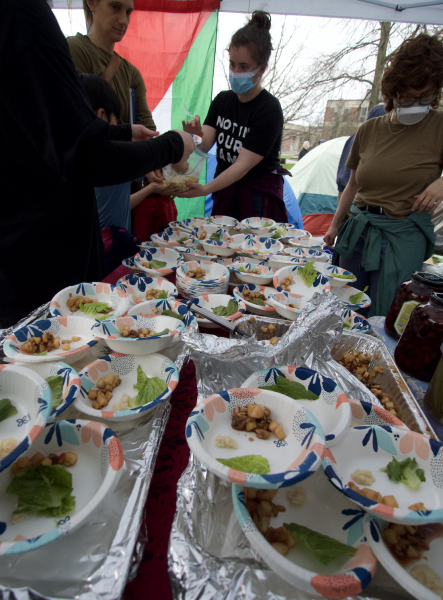
April 28, 7:25 p.m.
As the protest continues, students reported hearing that police officers may punish protesters for misconduct.
“[Police] said they were going to ID people and if people didn’t produce IDs then they would be facing potential suspension for the rest of the semester,” said an anonymous leader of Students for Justice in Palestine. “They didn’t ID people.”
Due to safety and security concerns, overnight occupancy of a “temporary structure” is not permitted on UVM’s campus, according to the University Operating Procedure.
“The only issue here right now are the tents,” said Michael Schirling, chief safety and compliance officer. “Everything else that’s happening is within our guidelines for a demonstration.”
Organizers are continuing as planned.
“We have a lot of people. Energy is high. And we’re all here feeling an immense sense of love, compassion, and hope for humanity. That’s what’s driving all of us right now,” said the anonymous leader of SJP. “And in the middle of all this genocide, war and destruction, this is a really beautiful community that we’re seeing right now.”
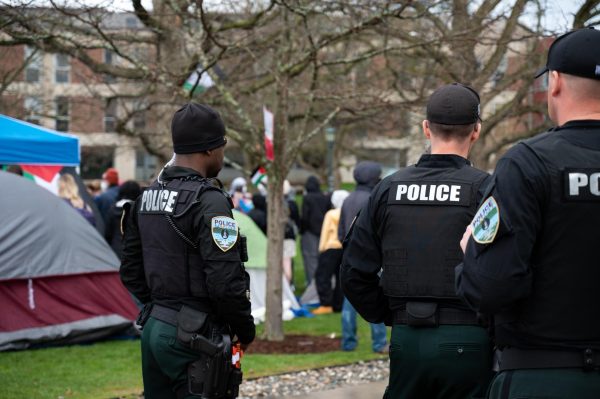
April 28, 6:20 p.m.
Preparations for the Seder are underway, with food and supplies now in the encampment.
“Some students were going individually into the library and bringing some [food] in hidden.” said first-year Tatum Palmer. “They were going back and forth so it was harder to pick out the ones bringing food in and out. I think the [police] just caved because they saw how much food was able to get in.”
Around 5:20 p.m., Wafic Faour of Vermonters for Justice in Palestine spoke.
“Don’t be scared of the police, they are scared of you,” he said.
At around 5:52 p.m., the crowd of protesters had increased to about 100, according to UVM Police Chief Tim Bilodeau.
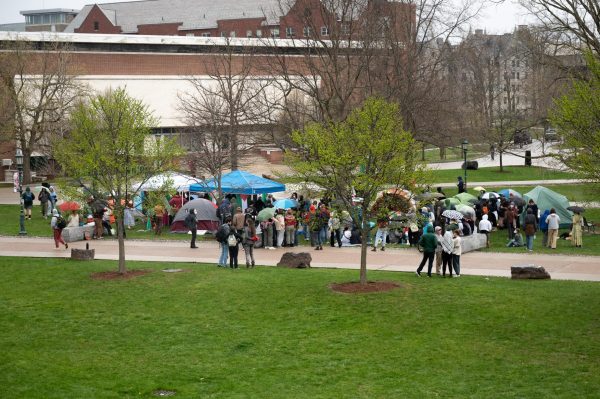
April 28, 6:00 p.m.
Organizers began setting up to hold a Liberation Seder, which will occur at 6:30 p.m., according to Jewish Voice for Peace Vermont and New Hampshire’s Instagram.
As organizers began bringing in food, they were stopped by UVM Police Services.
“We were carrying food, a table and another canopy thing,” said first-year Caitlin. “As we got closer to the encampment there were a bunch of cops there saying ‘you guys have to stop.’”
“[Police] said we couldn’t bring in any food because we were supporting an illegal encampment,” Caitlin said.
At 4:34 p.m., as an organizer tried to bring in supplies, police officers intervened preventing them from bringing supplies into the encampment, said junior Gigi Laforte who witnessed the altercation.
Laforte took a video as the altercation ended.
“The cop fully grabbed them and shoved them,” Laforte said. “He was being very aggressive.”
Student protesters began chanting regarding supplies for the Seder not being allowed into the encampment.
“We have Jewish, anti-Zionist students who are here standing with us today who I’m sure would like to celebrate the last day of Passover,” said a student organizer.
April 28, 3:10 p.m.
At approximately 2:02 p.m. UVM Students for Justice in Palestine established an encampment on the Andrew Harris Commons, joining universities across the country in demanding the University disclose investments and divest from all companies involved in occupation of Palestine, according to an April 28 Instagram post from the group.
Around fifty people have gathered across from Howe Library with approximately fifteen tents.
The following writers contributed to this staff report:
Alex Strand, Features staff writer
Noah Diedrich, Cynic news reporter
Liliana Mefford, Features editor
Nora Sissenich, Features staff writer
Lindsay Foxwell, Features staff writer
Natalia Somoff, Features staff writer
Maggie O’Shea, Culture staff writer


